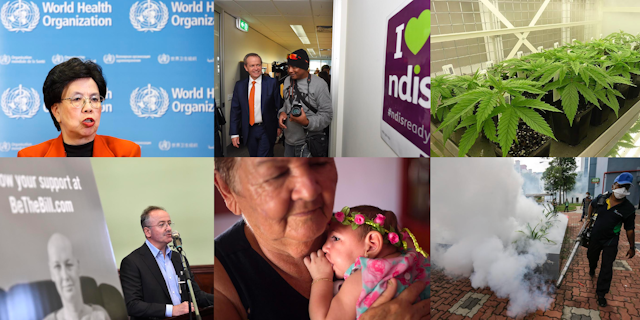Health spent a lot of time in the spotlight in 2016. Medicare was a major issue in Australia’s federal election and numerous government reviews into health were announced and reported.
Labor campaigned hard for this year’s election to be a referendum on the future of Medicare. While changes to the billing system would have no effect on access to Medicare, the attempt at fear-mongering (labelled “Mediscare”) resonated with voters and became a major election headache for the Coalition.
As Jim Gillespie wrote, it was successful because the Coalition has a history of “ambivalence – or open hostility” to Medicare.
Fear also surrounded the future costs of medical tests and imaging, as the government announced it would remove the bulk-billing incentives for pathologists. Pathologists said they would have to pass on the cost to patients, until a deal was struck with the government to help rein in rental costs.
Similarly, GPs warned they would have to pass on costs to patients as the government remained unwilling to end the freeze on rebates to GPs.
This year was also the year of the health review. The government announced reviews into private health insurance, Medicare items and pharmacy regulation.
NDIS

On July 1, the National Disability Insurance Scheme (NDIS) moved from the trial phase to a full national roll-out.
It was described as the most significant social reform since Medicare was introduced in 1975.
Under the NDIS, Australians under 65 with severe disabilities were given funding packages to purchase chosen supports.
Paul Ramcharan wrote:
The NDIS seems a worthy investment which, on the face of it, achieves our common wish to treat all humans with dignity and as equal citizens.
The number of people receiving the packages is expected to grow to about 460,000 when the scheme becomes fully operational in July 2019. However, computer and other glitches have meant it’s not reaching as many people as was expected.
Our seven-part series, Understanding the NDIS, explored the evolution of society’s responses to disability, how the scheme affects Indigenous Australians with disability, and which groups are likely to miss out on the funding packages.
Zika
Taking up significant space in health news all over the world in 2016 was the Zika virus. The outbreak was first brought to our attention from Brazil, where it was feared an influx of travellers for the Olympics would turn the virus into a global pandemic.

Our extensive coverage took a level-headed approach to the risks, and whether the virus would affect Australians. We looked at vaccine development, transmission, who was most affected, and the devastating health conditions that follow Zika infection.
The future of health
Some progress was made on the big policy debates in health, with federal legislation passed to allow cannabis to be grown for medicinal purposes. But as Alex Wodak wrote, we still have some way to go to get it to those who need it.
And despite ongoing debates, laws allowing physician-assisted suicide for the terminally ill have yet to pass in any Australian jurisdiction. Victoria has announced it will hold a conscience vote in parliament next year, and experts say this state might be the first to legalise it.

This year we also saw many calls from different groups to impose taxes on sugar – particularly on beverages that are said to be a leading cause of obesity.
The UK introduced such a tax earlier in the year. Our experts calculated it could save 1,600 lives while recouping some of the costs of obesity to the public purse.
A recent Grattan Institute report proposed the government:
… put a tax on sugar-sweetened beverages to recoup some of the third-party costs of obesity and reduce obesity rates. Such a tax would ensure the producers and consumers of those drinks start paying closer to the full costs of this consumption – including costs that to date have been passed on to other taxpayers. There is the added benefit of raising revenue that could be spent on obesity-prevention programs.
Series and specials
This year The Conversation introduced a few new editorial products on health, while continuing some of the oldies (but goodies).
We continued as a reliable source of health news. Our new series Research Check debunked sensational health research reports such as chocolate improving brain function and paracetamol in pregnancy leading to misbehaving kids.

Our new Science or Snakeoil series tested health products and whether or not they live up to their claims. We looked at A2 milk, liver detoxes and popular weight-loss products (hint: they usually don’t).
We also started new series looking at common drugs we take and how they work, and unusual health conditions.
Our weekly consumer Health Check series continued this year. Popular articles included answers on why we get dizzy, whether man flu is real and how long sex normally lasts.
Areas of health we took an in-depth look at this year included: brain control; coping with mortality; how Australians die; men’s, women’s and children’s health; the gut; and the state of Australia’s hospital system.
Our biggest projects for the year were interactive body maps looking at what causes cancer and the risks of not exercising.
A big thank you to all our contributors for the year, both regular and occasional, and to our columnists. And, of course, thank you to our readers. We wish you a healthy and happy 2017.
Alexandra Hansen, Fron Jackson-Webb, Anna Evangeli, Sarah Keenihan and Sasha Petrova

